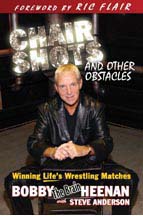Wrestlers writing a book are rapidly becoming a common occurrence, but only Mick Foley had released a follow-up book until now. Bobby “The Brian” Heenan has delivered Chairshots and Other Obstacles: Winning Life’s Wrestling Matches.

It’s the follow up to 2002’s Wrestling’s Bad Boy Tells All, and is now on shelves. Much like Foley’s book, the follow-up is just as good as the original, and ranks up there as one of the best books by a wrestler ever written.
Instead of a chronological look back at his career, the new book is more of a series of random thoughts and stories put together. In some hands this would be a disaster, but Heenan and writer Steve Anderson make it flow and coherent, and just plain work. Chock full of helpful advice about education, breaking into wrestling, raising children, separating work and home life, family and marriage, and a myriad of other topics, the book does so not in a preachy way, but instead in the laugh out loud humour that has always been the Heenan trademark.
A highlight of the book is the foreword, by Ric Flair, and the way each chapter starts with a story of some sort, and a drawing by Anderson (whose work was frequently in the PWI family of magazines) and a famous “Brain” tagline. Long-time fans will fondly recall the many, many smart ass remarks Heenan made as a commentator alongside Gorilla Monsoon, such as “A friend in need is a pest,” “They say money can’t buy happiness. Give me 50 bucks and watch me smile” and “Remember the old saying, ‘What the hell, use the bell.'”My favorite chapter was by far “Kids and What They Teach Us.” The series of anecdotes about his relationship with daughter Jessica are both touching and hysterically funny. It becomes quickly obvious that Jess is a spitfire like her dad, causing you to wonder what Heenan’s wife Cindi had to go through dealing with those two. You can’t help but like the idea of an 11 year old who had the guts to march into Vince McMahon’s office, hold out a hand and say “You owe me 50 bucks.”
The chapter “Cancer: The Ultimate Heel” explores the battles with cancer he and his wife both have faced in the past three years. Heenan doesn’t take a “poor me” stance and emphasizes that he concentrated on being strong and his determination to survive. In fact, he states “No one needs to feel sorry for me. I’ve been to an all night gas station and I’ve gotten my face slapped in the back seat of a car. I’ve had the opportunity to run from angry parents protecting the virtue of their daughter.” He goes on to say that seeing children battling cancer put his own battle in perspective. “Some of these kids have never played ball or thrown a ball. They’ve never had a crush or been embarrassed when a girl kissed them. They’ve never been to a dance. They may not grow up just so they can be kids. I don’t know why. It’s not fair. They say life’s not fair. Well, what’s the alternative or answer to that? I say death isn’t fair. Life seems to be the only fair thing we have right now.”
One of the advantages of a book being written by someone no longer affiliated with the WWE or other organizations is that the author gives more of a sense of honesty then in some WWE-produced books. When Heenan shares his thoughts on various personalities, you can tell he is telling the truth, rather then toeing the company line. The book also allows fans that only started watching in the ’80s and ’90s to have an idea of what wrestling was like in the ’60s and ’70s: low payoffs, especially for a manager, hours of travel, and the AWA airplane that, from reading the stories, seemed to be a accident waiting to happen, all give you an idea of what life was like before the WWE expansion, and what life is still like on the independent scene.
If you get one wrestler book this year, don’t be a mooch and borrow it from a friend, but go out and pick up Chairshots. It is worth a look, and something that will be easy to re-read again in the future, with just as much enjoyment.
RELATED LINK

